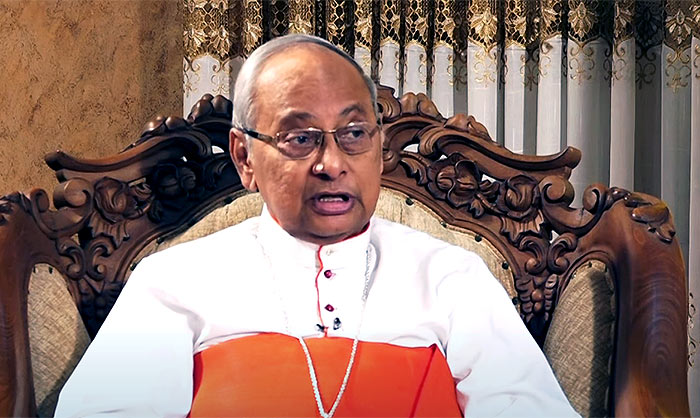Sri Lanka on alert for attacks as archbishop slams poor church security

Sri Lankan security officials have warned that Islamist militants behind Easter Sunday’s suicide bombings are planning attacks and could be dressed in uniform, as the archbishop of Colombo complained about insufficient security around churches.
The militants were targeting five locations for attacks on Sunday just passed or on Monday, security sources said.
“There could be another wave of attacks,” the head of the police ministerial security division (MSD) said in a letter to lawmakers and other officials seen by Reuters on Monday.
“The relevant information further notes that persons dressed in military uniforms and using a van could be involved in the attacks.”
There were no attacks on Sunday and security across Buddhist-majority Sri Lanka has been ramped up, with scores of suspected Islamists arrested since the April 21 attacks on hotels and churches that killed more than 250 people, including 40 foreign nationals.
The government has also banned women from wearing face veils under an emergency law that was put in place after the attacks.
There were concerns within the Muslim community that the ban could fuel tensions in the multi-ethnic nation. But government officials said it would help security forces identify people as a hunt for any remaining attackers and their support network continues across the Indian Ocean island, which was gripped by civil war for decades until 2009.
The Archbishop of Colombo, Malcolm Ranjith, said that security had not been sufficiently stepped up around churches.
“We are not satisfied with the security arrangements and urge authorities to ensure our safety,” he told reporters.
Authorities suspect members of two little known groups – National Thawheedh Jamaath (NTJ) and Jammiyathul Millathu Ibrahim – of carrying out the Easter attacks, though Islamic State has claimed responsibility.
Prime Minister Ranil Wickremesinghe said a tight-knit group of people was involved, mostly close friends and families. They spoke face-to-face, possibly to evade electronic surveillance.
“They were small enough that they were not using normal communications, instead meeting each other,” Wickremesinghe told Reuters.
He added the coordinated bombings, the type of explosives used and the tightly guarded plot suggested the bombers had guidance.
“ISIS has claimed, we also felt there has to be some international links,” he said, referring to Islamic State.
Authorities believe Zahran Hashim, the founder of NTJ, was the mastermind and one of the nine suicide bombers.
One military source told Reuters that five sets of white attire commonly worn by Buddhists when visiting temples were recovered from a safe house in the east, the site of a gun battle on Friday that killed Zahran’s father and his two brothers.
His wife and daughter escaped an explosion with minor injuries, hospital staff and police said.
ROW OVER POLICE CHIEF
Many Sri Lankans believe a deep rift between President Maithripala Sirisena and Wickremesinghe has undermined national security.
Sirisena fired Wickremesinghe last year, after months of tension, only to be forced to reinstate him under pressure from the Supreme Court.
Since then their relationship has deteriorated further to the point where their factions actively try to undermine each other, including not sharing security information, defense sources say.
Sirisena said on Monday he had appointed Chandana Wickramaratne, the second in command at the police, as acting police chief.
Over the weekend, two sources at the president’s office told Reuters that Pujith Jayasundara, the police chief who was appointed by Wickremesinghe, was refusing the president’s request to step down for not sharing information about the attacks.
“Since there is an investigation into his possible failure in preventing the attacks, Jayasundara has been sent on compulsory leave,” a source close to the president told Reuters.
It was not immediately possible to contact Jayasundara on Monday.
The president has also appointed General Shantha Kottegoda as the new defense secretary, replacing Hemasiri Fernando who resigned after the bombings, saying that some institutions under him had failed.
Kottegoda, 69, army commander between 2004 and 2005, was instrumental in weakening Tamil Tiger rebels by breaking away an allied group.
The archbishop criticized the bickering at the top levels of government.
“At a time when the whole country has been affected by a major catastrophe, politicians should stop finding fault with each other,” he said.
“Instead they must have broad discussion on what steps needed to be taken to solve this and take this country out of this crisis.”
Sri Lanka’s Tourism Bureau chairman, Kishu Gomes, said tourist arrivals in Colombo were expected to fall 50 percent over the next two months because of the bombings. Tourist arrivals in areas elsewhere in Sri Lanka would likely go down by about 30 percent, he told reporters at a travel conference in Dubai.
In India, police said they had raided the homes of three people in the southern state of Kerala, close to Sri Lanka, in connection with their links to Islamic State. They did not say if there was any connection to the attacks in Sri Lanka.
(Reuters)

Latest Headlines in Sri Lanka
- Military deserter arrested for sexually assaulting doctor at Anuradhapura Hospital March 12, 2025
- Tuition teacher under investigation for student assault ignores NCPA summons March 12, 2025
- Sri Lanka maintains stance on Adani, open to investment March 12, 2025
- Doctors strike over delay in arrest of sexual assault suspect March 12, 2025
- Sri Lanka to introduce freelancer registration system for banking and financial benefits March 11, 2025


